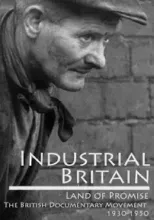Industrial Britain
Robert J. Flaherty, Arthur Elton, Basil Wright (Reino Unido, 1933) [B/N, 22 min]


(filmaffinity)
Robert J. Flaherty, Arthur Elton, Basil Wright (Reino Unido, 1933) [B/N, 22 min]


(filmaffinity)
Sinopsis:
- [fuente] Flaherty trata de plasmar el ambiente industrial de Reino Unido y su influencia en la gente trabajadora.
Comentario personal:
- Tras ser despedido por la Metro-Goldwyn-Mayer del rodaje de White Shadows in the South Seas (Sombras blancas. W.S. Van Dyke, 1928) Flaherty, invitado por John Grierson, se trasladó a Gran Bretaña para colaborar con los documentalistas del "Film Unit" y comenzó a filmar un obra sobre la industria que combinaba su visión romántica de la vida tradicional -el trabajo manual del obrero-artesano frente a la máquina- con el enfoque social y didáctico de la escuela británica. Sin embargo, el sistema de trabajo de Flaherty era incompatible con los esquemas del Film Unit -se negó a escribir un guión mientras filmaba tomas de "impresiones"- y Grierson le retiró del proyecto. "Industrial Britain" fue finalmente montada por Edgar Anstey y John Grierson, que añadieron un comentario en off a una selección de imágenes para dotarlo de una estructura y un discurso coherente. Con otros materiales filmados por Flaherty se crearon otros tres documentales: "Art of the English Craftsman", "The English Potter" y "The Glassmakers of England" (1933). Flaherty abandonó el Film Unit y viajó a Irlanda, donde culminaría una de sus obras maestras "Man of Aran" (1934), pero su estancia en Gran Bretaña no resultó un fracaso, ya que contribuyó decisivamente a sentar las bases del movimiento documentalista británico: "el tratamiento creativo de la realidad", una imagen cargada de poesía, cercana al mundo del trabajo y la realidad social, e inserta en un discurso didáctico y asequible para las masas (JD).
En Docuzone se escribió:Industrial Britain es un documental que comenzó a realizar Robert Flaherty pero fue terminado por John Grierson. El documental muestra el ambiente industrial de los años 30 en Inglaterra. La manera en la cual la revolución industrial había cambiado a Gran Bretaña y a su población, y demostrado la importancia duradera de la artesanía, en una época de producción en masa -"la artesanía y la habilidad del obrero redunda en una calidad que solamente el individuo puede dar"-. El documental retrata al trabajador y su ambiente inmediato, y el orgullo que un artesano británico tiene de su arte a pesar de la acometida de la mecanización.
Synopsis: A survey of industry in Britain, emphasising the importance of craftsmanship.
Commentary: Industrial Britain represents a watershed in the development of the British documentary movement, the moment when artistic achievement was first blended meaningfully with social intent. The film developed from John Grierson's opportunistic recruitment of Robert Flaherty. Flaherty was an anthropologist-cum-filmmaker who shot to worldwide prominence with Nanook of the North (1920), a documentary that detailed the hardships of Eskimo life.
Anxious to secure a prestige director for the project (Anthony Asquith had already turned them down) The Empire Marketing Board turned hopefully to a near-destitute Flaherty. Soured by failure in Hollywood and inspired by the high-seriousness of early Soviet cinema, Flaherty exchanged the exoticism of his previous work for an appreciation of Britain's industrial workers. Many of his sequences - like the English potter - were considered successful enough to merit a subsequent release as shorts.
However, Flaherty's intuitive way of working (he refused to write a script and instead filled reels of film with things that interested him, from static shots of Saltash Bridge to electricity pylons) proved unacceptably extravagant for a government agency. Flaherty was fired and it was left to Edgar Anstey to edit Flaherty's fragmentary impressions into a coherent whole. Hence the grandeur of Flaherty's imagery was accompanied by an assertive, sociologically-minded editorialising that was temperamentally at odds with its Canadian mentor. Almost by accident, the basic mode of documentary cinema in Britain had been created.
Industrial Britain provides a dramatic illustration of how the young British documentary movement grappled with the influence of the genre's founding father. Flaherty's ethos was essentially that of a 19th Century conservative individualist; he was attracted to the elemental extremes of nature and was suspicious of the mechanisation of the modern world. In films like Housing Problems (d. Arthur Elton/Edgar Anstey, 1935), on the other hand, the young progressives of the British documentary movement would propound scientific solutions to the social and economic problems of the interwar period.
EMB filmmakers learnt from Flaherty's aesthetic approach, but would eventually dismiss his deeper artistic instincts as escapist. Thus as the depression deepened, the amiably ragged Industrial Britain would become the pointedly professional Coal Face (d. Alberto Cavalcanti, 1935). (Scott Anthony, BFI ScreenOnline)
- Otras referencias
- "La escuela documental británica", por Anna Petrus. Miradas de Cine, nº 90 (septiembre 2009).
- Encuentros con lo real. Cine documental británico (1929-1950), por Israel Paredes Badía e Hilario J. Rodríguez. Madrid, Calamar Ediciones/ Festival de Cine de Huesca, 2008; 168 pp.
Reseñas: El Cultural / Revista Clarín.
Ficha técnica
- Guión: Robert J. Flaherty.
Fotografía: Arthur Elton, Basil Wright.
Productora: Empire Marketing Board Film Unit.
Intervenciones:
- Donald Calthrop (locución).
- Obreros y artesanos británicos.
DVDRip VO - MKV (X264/AVC+AAC) [422 Mb] (Publicada por corvo1959 en SurrealMoviez)
detalles técnicos u otros: mostrar contenido
 Industrial.Britain.1931.DVDRip.x264.AAC-SMz.mkv [422.16 Mb]
Industrial.Britain.1931.DVDRip.x264.AAC-SMz.mkv [422.16 Mb] 
 Descargar con Telegram desde RebeldeMule_Documentales
Descargar con Telegram desde RebeldeMule_Documentales- en Dailymotion
Relacionado:
- Land of Promise: The British Documentary Movement 1930-1950: Industrial Britain (Robert Flaherty, 1931) / Shipyard (Paul Rotha, 1935) / Workers and Jobs (Arthur Elton, 1935)
The Complete Humphrey Jennings Collection: Vol.1. The First Days 1934-1940 (2011) / Vol.2. Fires Were Started 1941-1943 (2012) / Vol.3. A Diary for Timothy 1944-1950 (2013)
Salud.
[ Add all 2 links to your ed2k client ]

